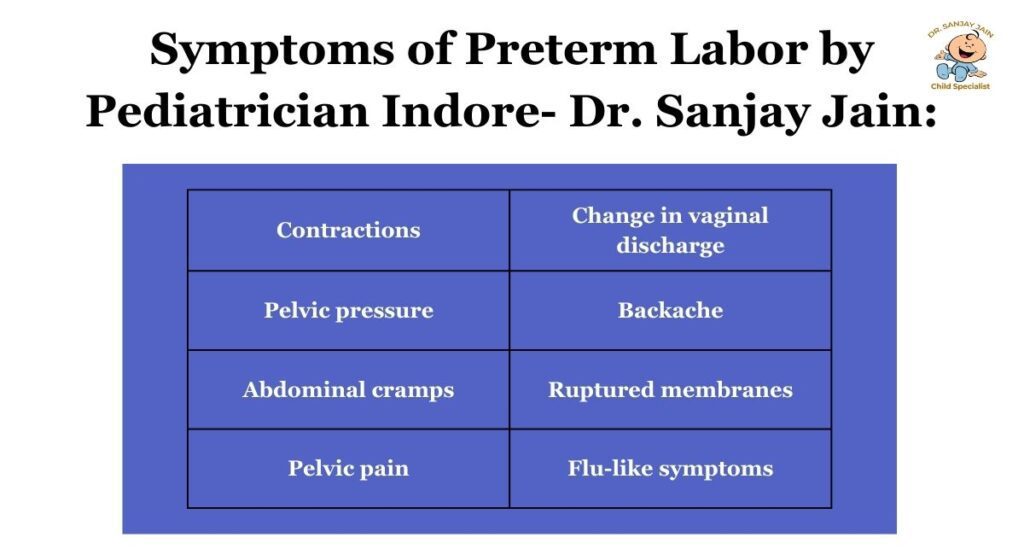What Is Preterm Labor?
Preterm labor refers to the onset of labor before the completion of 37 weeks of pregnancy. In other words, it is the occurrence of regular contractions and cervical changes that lead to the birth of a baby before reaching full term.
Symptoms of Preterm Labor by Pediatrician Indore-
• Contractions: Regular contractions, with or without pain, occur every 10 minutes or more frequently.
• Change in vaginal discharge: Watery, mucus-like, or bloody discharge.
• Pelvic pressure: Feeling increased pressure or a sensation of the baby pushing down.
• Backache: Persistent low back pain that doesn’t subside with rest.
• Abdominal cramps: Intense or persistent cramps, similar to menstrual cramps.
• Ruptured membranes: Fluid leakage from the vagina due to the amniotic sac rupturing.
• Pelvic pain: Sudden or severe pelvic pain different from normal pregnancy discomfort.
• Flu-like symptoms: Fever, chills, nausea, vomiting, or diarrhea accompanying other preterm labor signs.

How Is Preterm Labor Treated?
Preterm labor is treated through various approaches to delay or prevent premature birth. These include:
• Medications: Tocolytics relax the uterus, while corticosteroids enhance fetal lung maturity.
• Bed rest: Reduced activity may be recommended to minimize contractions and stress on the uterus.
• Cervical cerclage: Suturing the cervix closed provides mechanical support to prevent premature dilation.
• Antibiotics: Used to treat infections that may cause preterm labor.
• Magnesium sulfate: Administered to reduce the risk of neurological complications in preterm infants.
• Neonatal transfer: In high-risk cases, the mother may be transferred to a hospital with a NICU.
Treatment plans are tailored to individual circumstances, aiming to achieve the best outcomes for both mother and baby.
What Are Possible Complications Of Preterm Labor?
Preterm labor can lead to various complications for both the baby and the mother, including:
• Respiratory problems
• Infections
• Developmental delays
• Feeding and digestive issues
• Temperature regulation problems
• Jaundice
• Long-term disabilities
• The emotional and psychological impact.

What Can You Do To Prevent Preterm Labor- by Pediatrician Indore– Dr. Sanjay Jain:
To potentially prevent preterm labor:
• Seek regular prenatal care.
• Take care of your overall health.
• Avoid smoking, alcohol, and drugs.
• Manage chronic conditions.
• Stay hydrated and practice proper nutrition.
• Minimize stress and excessive physical exertion.
• Practice good hygiene.
• Be aware of warning signs and report any concerns to your healthcare provider.
Checkout our Google My Business Page
Conclusion
Key Points to Remember About Preterm Labor By Child Specialist Indore-
• Preterm labor occurs before 37 weeks of pregnancy.
• Symptoms include contractions, cramps, back pain, or fluid leakage from the vagina.
• Treatment options include bed rest, medication, cervical stitching, or delivering the baby.
• Preterm labor can lead to preterm birth, increasing the risk of serious health problems for the baby.If you experience any symptoms of preterm labor, contact your healthcare provider promptly.





